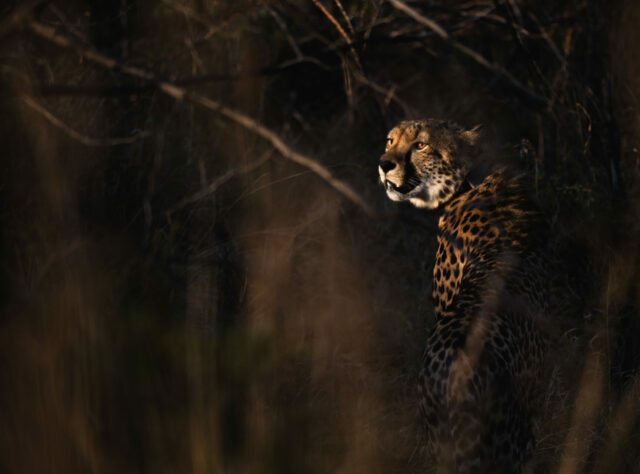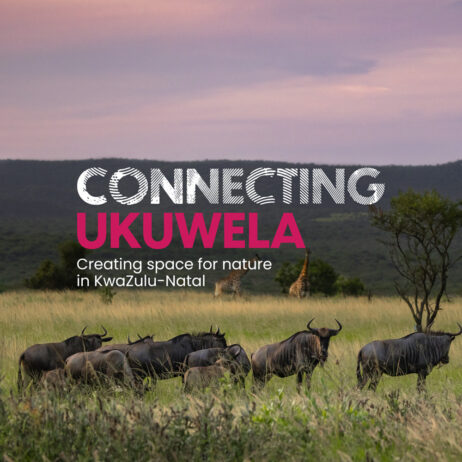
Cheetahs will travel across long distances to find the best hunting grounds. Credit: Chantelle Melzer
With our spring appeal: Connecting Ukuwela, you can help our partner Wild Tomorrow connect the Greater Ukuwela Nature Reserve— a wildlife corridor in South Africa’s KwaZulu-Natal. This will create an unbroken pathway from the Lebombo Mountains all the way to the Indian Ocean. But why is this connectivity so important for wildlife whose home ranges extend far beyond the reserve? The answer is simple: movement.
From the mountains
In the mountain ranges and valleys, female Cheetah (Acinonyx jubatus) move in small groups with their cubs, stalking Antelope. While the solitary males create and defend their smaller territories, the highly adaptable females travel long distances across a patchwork of habitats in search of fruitful hunting grounds. As the fastest of all land mammals, these large cats use their incredible speed and agility to chase down herds.
Across the plains
As the mountain slopes flatten into hilly plains, the Cheetah and their cubs might encounter their fiercer cousins. As the largest cat in all of Africa, Lion (Panthera leo) will travel as a pride to where prey and water sources are most abundant. Lion prefer drier, open savannas and will go to great lengths to outpace floods. As the main hunters of their groups, the female lions decide where the pride will go, and the rest follow their lead. Though they share a lot in common, Cheetah will always try and avoid a run in with Lion— which are larger, stronger, and have a habit of stealing other predators’ kills— even as cubs.
Sharing the plains, one species that holds no fear of either of these apex predators is the Black Rhino (Diceros bicornis). Unlike certain other herbivores such as Zebra (Equus quagga), whose herds run great distances across continents, the solitary Black Rhino do not tend to undertake long migrations. They instead prefer to graze their way across the savannas, towards the wetter, wooded regions and dense shrublands that provide all the food, water, and shelter they need.
To the ocean
As the largest living land mammal, African Savanna Elephant (Loxodonta africana) are known to migrate over long distances. Elephant herds are very social, communicating with each other to decide the best routes and corridors that connect different habitats, and pass the information on through the generations. Enjoying the dewy coolness that clings to the riverbanks, Elephants can be seen splashing through the wetlands that line South Africa’s ‘Elephant Coast’ and will travel considerable distances to find watering holes.
And back again
Also known as the Painted Dog and the largest canine in South Africa, African Wild Dog (Lycaon pictus) are lively nomads. Their family packs travel over long distances with the seasons, searching for their prey, mapping out their way, and sharing it among the group with barks and body language. Packs are very territorial and won’t settle in a place that is already occupied, so a travelling pack will often have to search a vast area for a good place to make their den.
Repairing a fragmented landscape
For species such as these roaming giants and swift, apex predators, traversing the landscape to new spaces is essential to their survival. Unfortunately, in the last century, KwaZulu-Natal has been fragmented by agriculture and unsustainable development. It’s protected areas are islands of biodiversity often surrounded by impassable farmlands, keeping nomadic species from their natural movement and leaving them vulnerable to poachers. For many, this has sent their numbers plummeting at an astonishing rate, some even to the brink of extinction.
By supporting our Connecting Ukuwela appeal and expanding the wildlife corridor of the GUNR, you can help give these species space to move throughout their vast home ranges and perhaps most importantly, help their isolated populations to mix and create the genetic diversity essential to their survival.
Don’t let these legendary species become myths
Read more here about our spring appeal: Connecting Ukuwela and donate today to see your donation matched to double its gift value.

